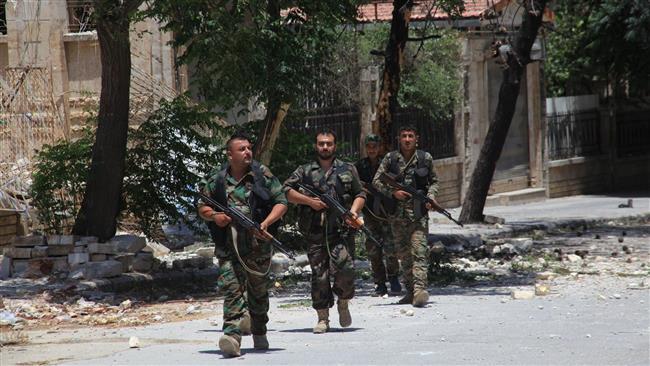Syria army retakes control of 90% of Mallah farms


The Syrian armed forces have managed to wrest control of more than 90 percent of the Mallah farms near the northwestern city of Aleppo, says a report.
The recapture of almost all of the farms, situated on the northeastern edge of Aleppo, came on Tuesday, the Lebanon-based al-Mayadeen television channel reported.
The gains enable the Syrian troops to fire upon and close the Castello road that links militant-held parts of Aleppo with the rest of the crisis-hit Arab country.
Meanwhile, state media aired footage showing Syrian army tanks and artillery pounding the Mallah farms.
Additionally, Alexander Kinshchak, Russia’s ambassador to Damascus, told Interfax news agency that the Syrian army is now in control of approximately half of Aleppo, while the other half remains in the grip of militants.

He further warned that al-Qaeda-linked al-Nusra Front and other terrorists are trying to break through the frontline and to surround government forces in Aleppo and block their supply routes.
However, Russia is aiding the Syrian soldiers in Aleppo and has prevented the encircling of Damascus forces, he added.
“We are supporting the Syrians, in this case their defensive operations, as al-Nusra has been bringing in reserves, additional troops and weapons. Our aircraft are trying to destroy those targets on approach routes in order to weaken the offensive potential of the terrorists,” the Russian envoy said.
Also on Tuesday, Syrian sources said Nusra Front and Ahrar al-Sham have stolen the equipment of a power plant in Aleppo and transferred it to Turkey.
Syria has been gripped by foreign-backed militancy since March 2011. United Nations Special Envoy for Syria Staffan de Mistura estimates that over 400,000 people have been killed in the conflict. The UN has stopped its official casualty count in Syria, citing its inability to verify the figures it receives from various sources.
Russia launched an aerial military campaign against terrorist groups in Syria last September upon a request from the government in Damascus. The air raids have expedited the advances of Syrian forces against the militants on the ground.
A ceasefire brokered by the US and Russia went into effect in Syria on February 27, but it does not apply to the Nusra Front and Daesh terrorist groups. Renewed violence in some parts of Syria, particularly around Aleppo, has left the truce in tatters in recent weeks.

In another development on Tuesday, one civilian was killed and four others sustained injuries in terrorist attacks across the city of Aleppo.
The casualties came after militants fired mortar shells on the neighborhoods of al-Neil Street, Khalidiyah and Hamidiyah.







